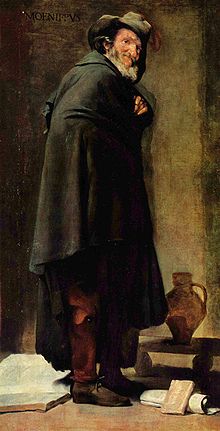- Menippus
-
Menippus (Greek: Μένιππος; 3rd century BC) of Gadara, was a Cynic and satirist. His works, which are all lost, were an important influence on Varro and Lucian. The Menippean satire genre is named after him.
Contents
Life
Little is known about the life of Menippus. He was a native of Gadara in Coele-Syria.[1] The ancient sources agree that he was a slave. He was in the service of a citizen of Pontus, but in some way obtained his freedom and lived at Thebes. Diogenes Laërtius[2] relates a dubious story that he amassed a fortune as a money-lender, lost it, and committed suicide through grief.[3] Lucian ranks Menippus with Antisthenes, Diogenes, and Crates as the most notable of the Cynics.
Writings
His works (written in a mixture of prose and verse) are all lost. He discussed serious subjects in a spirit of ridicule, and especially delighted in attacking the Epicureans and Stoics. Strabo and Stephanus call him the "earnest-jester" (Greek: σπουδογελοίος, spoudogeloios). His writings exercised considerable influence upon later literature, and the Menippean satire genre is named after him. Although the writings of Menippus no longer survive, there are some fragments of Varro's Saturae Menippeae, which were written in imitation of Menippus.[4] One of the dialogues attributed to Lucian, his avowed imitator, who frequently mentions him, is called Menippus, but since the sub-title ("The Oracle of the Dead") resembles that of a work ascribed to Menippus by Diogenes Laërtius, it has been suggested that it is imitated from his Necromancy.
Diogenes Laërtius says the following works were written by Menippus:[5]
- Νέκυια - Necromancy
- Διαθῆκαι - Wills
- Ἐπιστολαὶ κεκομψευμέναι ἀπὸ τῶν θεῶν προσώπου - Letters artificially composed as if by the Gods
- Πρὸς τοὺς φυσικοὺς καὶ μαθηματικοὺς καὶ γραμματικοὺς - Replies to the Natural Philosophers, and Mathematicians, and Grammarians
- Γονὰς Ἐπικούρου - The Birth of Epicurus
- Τὰς θρησκευομένας ὑπ' αὐτῶν εἰκάδας - The School's reverence of the twentieth day (celebrated in the Epicurean school)
In addition, Athenaeus mentions works called Symposium[6] and Arcesilaus,[7] and Diogenes Laërtius mentions a Sale of Diogenes (Greek: Διογένους Πράσει)[8] written by Menippus which seems to be the main source of the story that Diogenes of Sinope was captured by pirates and sold into slavery.
Notes
- ^ Stephanus Byz.; Strabo, xvi.
- ^ Diogenes Laërtius, vi. 99, 100
- ^ "The tradition that he was a moneylender and speculator in marine insurance is probably apocryphal, resting as it does on the always dubious authority of Hermippus." Donald Dudley, (1937) A History of Cynicism, page 70
- ^ Cicero, Academica, i. 2, 8; Aulus Gellius, ii. 18; Macrobius, Sat. i. 11
- ^ Diogenes Laërtius, vi. 101
- ^ Athenaeus, 14.629F
- ^ Athenaeus, 14.664E
- ^ Diogenes Laërtius, vi. 29.
External links
 Diogenes Laërtius, Life of Menippus, translated by Robert Drew Hicks (1925).
Diogenes Laërtius, Life of Menippus, translated by Robert Drew Hicks (1925).- Menippus - Lucian's dialogue in which Menippus visits Hades
Cynic philosophers Greek era Roman era Favonius · Demetrius · Dio Chrysostom · Agathobulus · Secundus · Demonax · Peregrinus Proteus · Theagenes · Oenomaus · Pancrates · Crescens · Heraclius · Horus · Asclepiades · SallustiusCategories:- 3rd-century BC philosophers
- 3rd-century BC writers
- 3rd-century BC poets
- Ancient Greek poets
- Ancient Greek satirists
- Ancient Greek slaves and freedmen
- Cynic philosophers
- Hellenistic era philosophers from Syria
Wikimedia Foundation. 2010.

